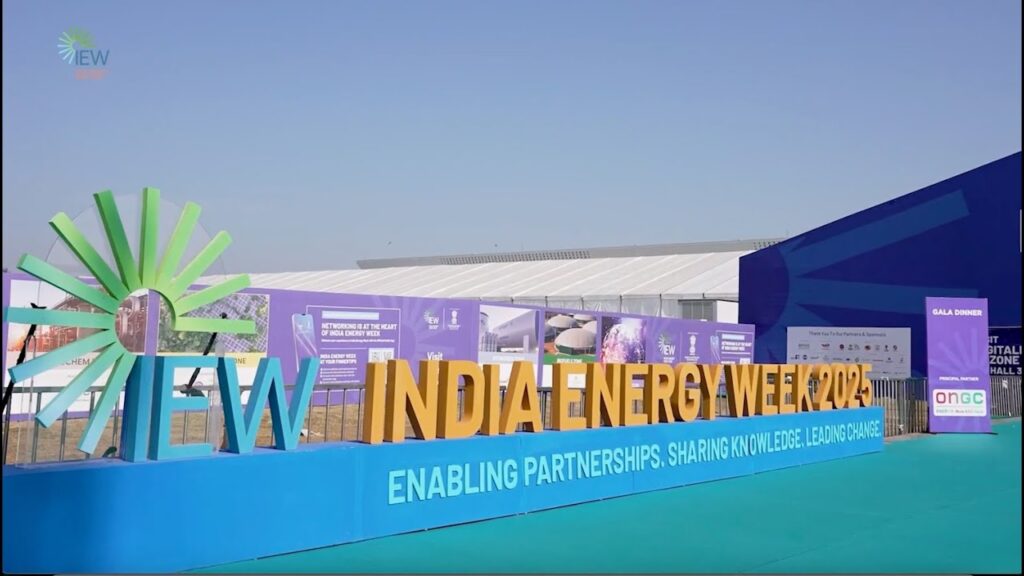India Energy Week 2025: A Step Toward Sustainable Energy Future

India Energy Week 2025, held in early April, served as a platform to highlight the country’s significant strides in the energy sector, marking another key milestone in India’s ambitious journey towards a sustainable and energy-secure future. With the world increasingly focused on climate change and the global transition to renewable energy, India has positioned itself as a critical player in this transformation. The event brought together industry leaders, policymakers, innovators, and thought leaders to discuss India’s energy achievements, its future goals, and the crucial role it plays in the global energy transition.
A Significant Year for India’s Energy Transition
The 2025 edition of India Energy Week was especially significant as it took place at a time when India is accelerating its efforts to transition towards clean energy and reduce its carbon footprint. With the goal of achieving net-zero emissions by 2070, India has committed to increasing the share of renewable energy in its energy mix, enhancing energy efficiency, and improving its energy access to all citizens. The event underscored these efforts and showcased the progress made over recent years.
At the heart of India’s energy transformation are its renewable energy projects. India has emerged as one of the world’s leading nations in solar and wind energy, with an installed capacity that has seen exponential growth in the past decade. The country aims to achieve 500 GW of renewable energy capacity by 2030, a goal that was emphasized throughout the discussions during the week. The India Energy Week 2025 highlighted key achievements, including record solar and wind installations, the development of solar parks, and the push toward cleaner technologies like green hydrogen.
Renewable Energy: India’s Rising Star
India’s renewable energy sector continues to grow rapidly, and the India Energy Week provided a platform to showcase the advancements made in solar, wind, and hydroelectric power. India has already established itself as one of the largest solar power markets globally, with an ambitious target to install 300 GW of solar power by 2030. The event saw the unveiling of new solar projects and technologies designed to boost efficiency and reduce costs. Additionally, the development of wind energy projects across coastal regions has seen significant progress, with India ranking among the top 5 wind power producers globally.
The week also focused on innovations in energy storage, which are crucial for addressing the intermittency of renewable energy. The government and private sector have been collaborating on creating large-scale battery storage solutions to ensure that renewable energy can be stored and distributed effectively. This technology is seen as a critical enabler of India’s green energy transition.
Energy Efficiency: A Pillar of India’s Growth Strategy
In line with India’s commitment to sustainability, the event also spotlighted the country’s push toward energy efficiency. As one of the world’s fastest-growing economies, India is placing considerable emphasis on reducing energy consumption in both industrial and residential sectors. The Energy Efficiency Services Limited (EESL) highlighted its achievements in promoting energy-efficient appliances, LED lighting, and building retrofits across the nation. These efforts not only reduce energy demand but also lower emissions and operational costs for businesses and households alike.
The adoption of energy-efficient technologies has been a cornerstone of India’s energy policy, with the government rolling out a number of initiatives to incentivize the use of clean technologies. The week also featured discussions on energy-efficient mobility solutions, including electric vehicles (EVs), which are becoming increasingly popular in India’s urban centers as part of the broader push to reduce dependence on fossil fuels.
Green Hydrogen and the Future of Energy
One of the most exciting developments showcased during India Energy Week 2025 was India’s growing focus on green hydrogen. As the world turns toward hydrogen as a clean alternative to fossil fuels, India has positioned itself as a leader in hydrogen production. The event spotlighted various initiatives, including government-led plans to establish green hydrogen hubs and the development of infrastructure for hydrogen production, storage, and distribution.
Green hydrogen is seen as a game-changer in industries such as steel, cement, and heavy transport, which are difficult to decarbonize through traditional renewable energy solutions. India’s National Green Hydrogen Mission, launched with the aim of making the country a global hub for green hydrogen production, is already setting the stage for innovations in this space. The event underscored the importance of creating a hydrogen economy that could meet domestic energy demands while also contributing to global energy security.
Clean Cooking and Energy Access for All
India Energy Week also emphasized the government’s efforts to ensure energy access for all citizens, particularly in rural and underserved areas. India has made significant progress in expanding access to clean cooking energy, especially with the rollout of the Pradhan Mantri Ujjwala Yojana, which provides free LPG connections to millions of women in rural households. Clean cooking is crucial for improving public health, reducing indoor air pollution, and lowering reliance on traditional biomass fuels.
The event also showcased innovations in decentralized energy solutions such as solar-powered microgrids and clean cookstoves, which have the potential to reach the last mile and provide affordable, reliable energy to rural India. These efforts are central to India’s broader goals of achieving universal energy access while simultaneously reducing environmental degradation.
The Role of International Partnerships
India’s energy journey has not been one of isolation. During India Energy Week 2025, the country reiterated its commitment to strengthening international partnerships in the energy sector. Whether it is through collaborations on renewable energy technologies, joint research and development in energy storage, or strategic energy trade agreements, India has been actively engaging with nations across the globe to ensure a secure, sustainable, and inclusive energy future.
The week saw several international collaborations being announced, including partnerships with countries like Japan, the U.S., and European Union member states, focusing on green technology transfer, financing renewable energy projects, and sharing knowledge on energy management practices.
Looking Ahead: India’s Energy Future
India Energy Week 2025 proved to be a significant event in highlighting the remarkable progress made by India’s energy sector in the transition to cleaner, greener energy. With a focus on renewable energy, energy efficiency, green hydrogen, and energy access, the week demonstrated that India is not just a major consumer of energy but also a global leader in the fight against climate change.
As India moves closer to its ambitious sustainability goals, India Energy Week 2025 underscored the role of both government and private sector partnerships in achieving these targets. With continued innovation, investment in clean technologies, and international collaboration, India is well on its way to securing a sustainable energy future, which will have profound benefits for both its citizens and the world at large.

